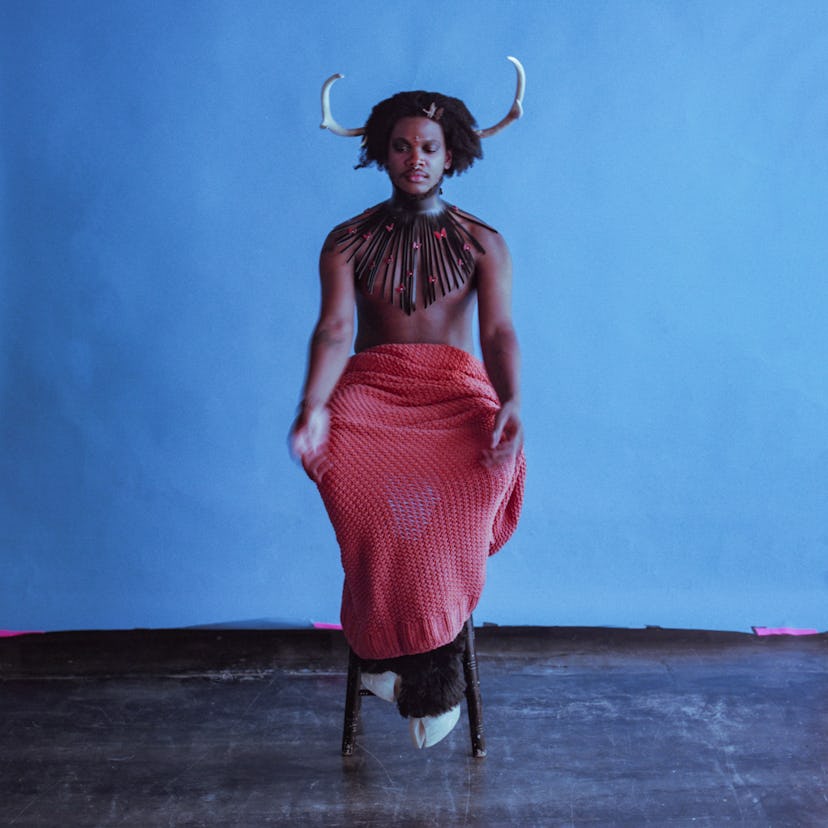On Heterosexuality, Indie Musician Shamir Speaks His Truth

“I’m not cisgender, I’m not binary, trans. I don’t wanna be a girl, I don’t wanna be a man. I’m just existing on this god-forsaken land.”
So goes the Philadelphia-based indie musician Shamir’s personal manifesto, a lyric from the single off his latest album, Heterosexuality, titled “Cisgender.” Shamir first experienced a breakout moment after his song “On the Regular” came out in 2014, and has released eight albums since. But on Heterosexuality, the artist finally reveals his true self. “There’s no metaphor, there’s no poetry,” Shamir tells me over the phone, having just left rehearsal with his band. “I’m just telling you what the hell is going on.”
For the past few years, Shamir, a central part of Philadelphia’s DIY music scene, has had tons going on: He wrote a book called But I’m a Painter, started his own record label, Accidental Popstar, and managed a clothing line, all before he turned 27 years old. In October 2020, he released a self-titled album that was met with critical acclaim.But at a moment when his hype was at its crest, Shamir took a break from writing music.
“The tap was off for a second,” he says. “The funny thing about it is, I actually write a stupid amount, generally speaking. But because I was also in the middle of an album cycle for most of quarantine, I just wasn’t writing.”
Then, the musician Isaac Eiger, also known by his moniker Hollow Comet—he’s a member of the Philadelphia band Strange Ranger—sent Shamir a message on social media asking if he’d like to work together. Eiger sent Shamir some music that moved the latter musician to near tears. “I was like, ‘Oh my god, I’ve been dreaming of this sound forever,’” Shamir recalls. “I had been dreaming it up in my head, but I didn’t know how to do it, and I couldn’t find other people to do it. And here he was, casually DM’ing it to me.”
Their collaboration, on writing and production, became the sonic highlight of Heterosexuality, which veers away from the pop-inflected, house-y sound that Shamir leaned on for years. Instead, Heterosexuality spans all kinds of genres—featuring jazzy moments, metal-influenced power chords, and beats that call to mind hip-hop from the early 2000s. This kind of melding of sounds required flexibility on Shamir and Eiger’s parts, something that Shamir says he might not have felt amenable to, even a year prior.
“The old Shamir would have never rewrote chords to a song,” he says. “I couldn’t fathom that. But I have this trust in Hollow Comet when it comes to my music that I’ve never had with any other producer. I never felt that until him, especially working with male producers in the past. But he kept hitting it out of the park, and that softened me.”
The result is arguably Shamir’s best work to date, an album that is incredibly raw, openly addressing the traumas of being a queer person in a heterosexual, binary world. The lyrics address tough dynamics within his closest relationships, takes aim at Jeff Bezos and corporate America, and the people who attempted to put him into a tidy, neat box when he first hit the scene. The honesty of his latest work drew the attention of Tom Sarig, who runs the label AntiFragile. In the middle of this album cycle, Shamir was signed.
“‘Cisgender’ was actually the song that got me signed,” Shamir says. “Tom heard the song and he was so moved—and he’s a cisgender, heterosexual, older white man. That, to me, was so powerful: for this song to still be able to resonate that heavily with someone like him. It made me think, these songs can resonate with anyone.”
Music became an obsession for Shamir at an early age. Growing up in North Las Vegas across the street from a farm—in a “dusty, barren, Southwestern, suburban town,” as he describes it—the artist didn’t find much excitement. But until he was in second grade, his mother’s twin sister lived in his childhood home, collaborating with local musicians in her bedroom, which she converted into a makeshift studio. “She’s not a musician at all, but she always wanted to write songs,” Shamir says of his aunt. “I would sneak into her room and say to them, ‘I'll be quiet! I won’t say anything, I promise!’ They’d let me sit in the corner and watch them write and arrange songs. It was the only fun thing that I had to cling to.” Once he entered high school, Shamir started his own band that made it to South by Southwest when Shamir turned 18. The next year, he released “On the Regular.” But instead of music publications and listeners honoring his musical chops and a sound that makes you want to get up and dance, coverage from that time focused on his sexual orientation.
Heterosexuality acts as stark rebellion from however the critics and haters might be tempted to classify Shamir—both now and then. Thrusting his true identity, complicated and hard-to-swallow as it may seem, into the light was a process that Shamir tells me was “cathartic.”
“I’m putting it out there and letting it go, but also transmuting it in a positive way,” he explains. “[The album] is less about my queerness explicitly and more about my relationship with the heterosexual world. I’ve talked about my experience through a lot of my music, throughout my catalog. But this one acknowledges the friction and the strife that I have with the heterosexual world, the heterosexual binary world that we live in.”